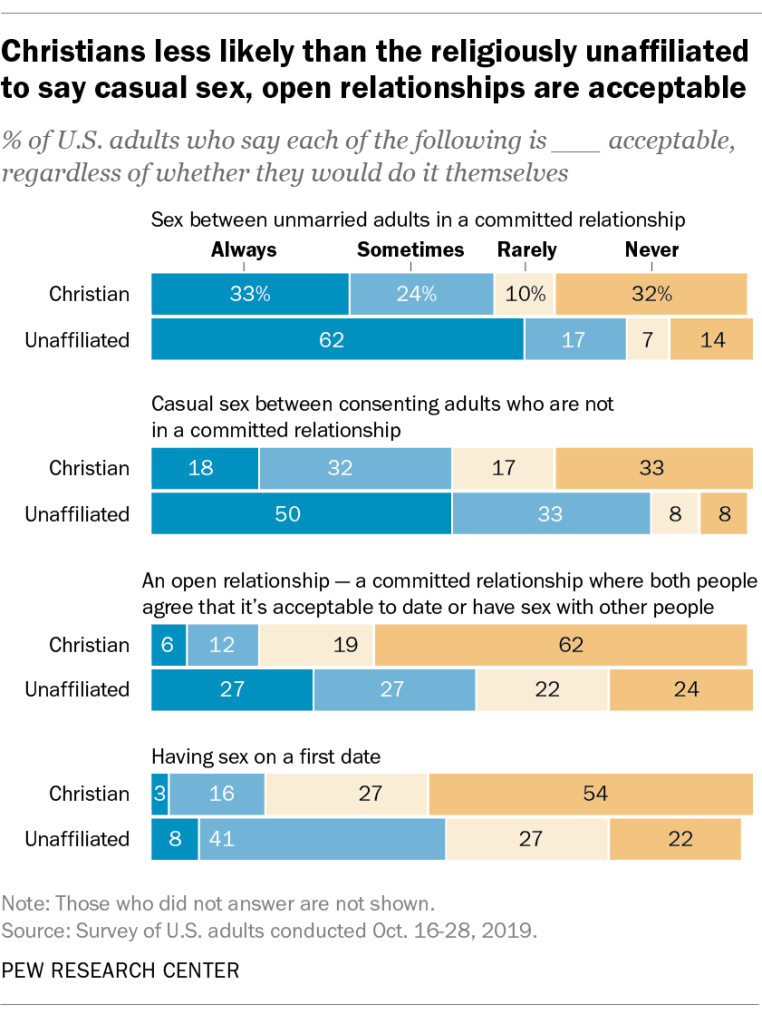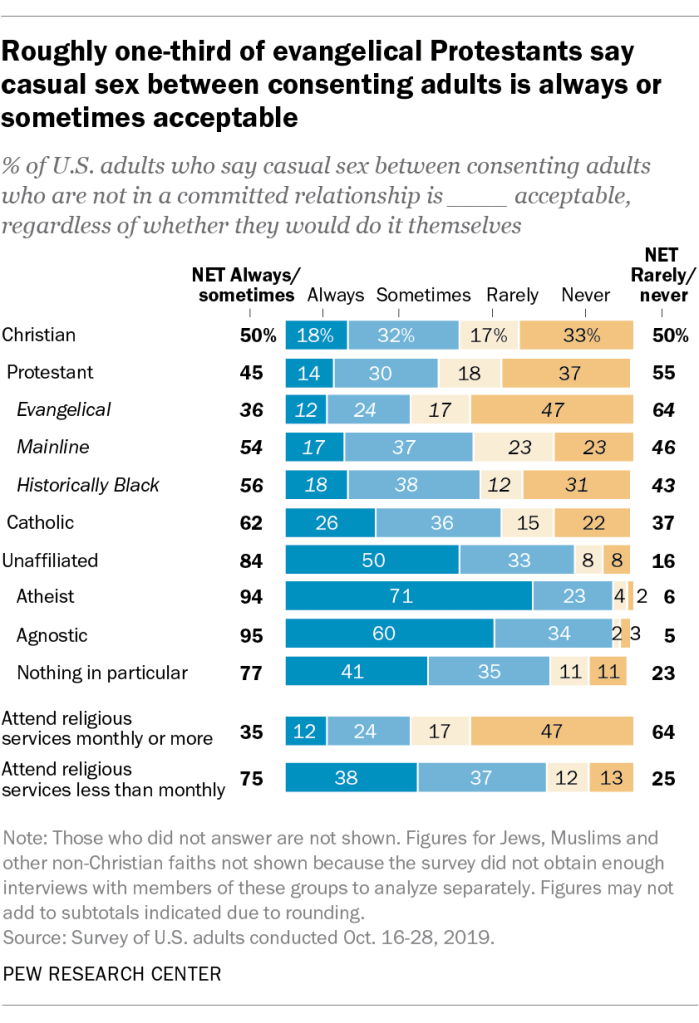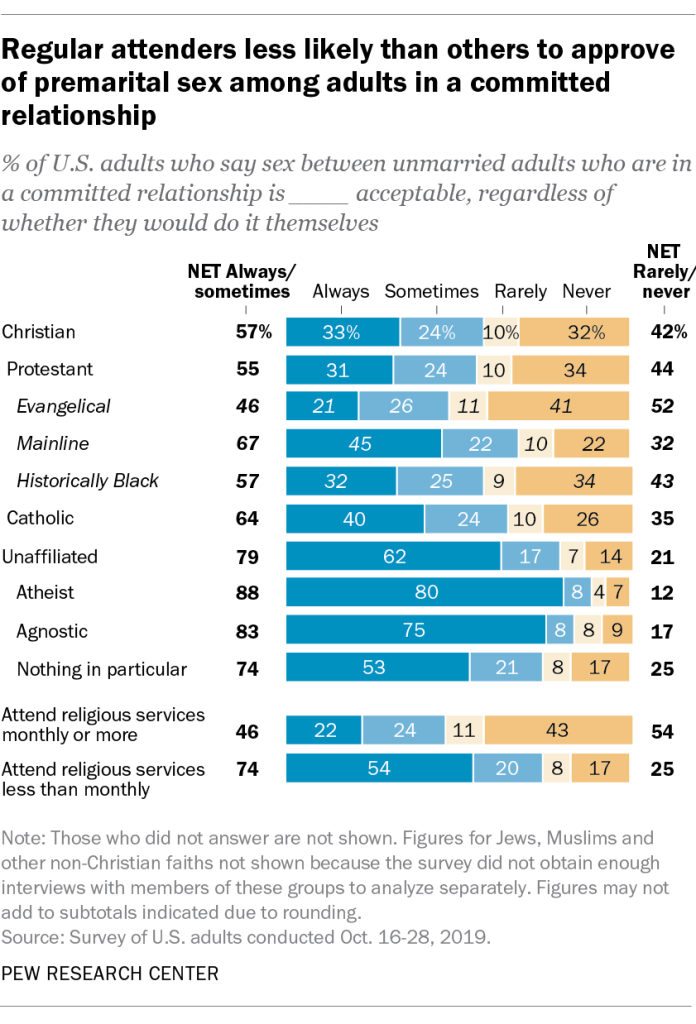
Many Christian traditions disapprove of premarital sex. And even though Christians in the United States hold less permissive views than religiously unaffiliated Americans about dating and sex, most say it’s acceptable in at least some circumstances for consenting adults to have sex outside of marriage, according to a recent Pew Research Center survey.
Half of Christians say casual sex – defined in the survey as sex between consenting adults who are not in a committed romantic relationship – is sometimes or always acceptable. Six-in-ten Catholics (62%) take this view, as do 56% of Protestants in the historically Black tradition, 54% of mainline Protestants and 36% of evangelical Protestants.
Among those who are religiously unaffiliated, meanwhile, the vast majority (84%) say casual sex is sometimes or always acceptable, including roughly nine-in-ten atheists (94%) and agnostics (95%) who say this. The religiously unaffiliated, also known as “nones,” are those who describe themselves, religiously, as atheist, agnostic or as “nothing in particular.”
Pew Research Center conducted this analysis to better understand how religiously affiliated Americans and religiously unaffiliated Americans differ in their attitudes about certain sex and dating behaviors. The analysis also explores how the attitudes of Americans who regularly attend worship services differ from those who attend less often.
These findings are based on a survey conducted Oct. 16 to 28, 2019, among 3,998 U.S. adults. This includes those who took part as members of Pew Research Center’s American Trends Panel (ATP), an online survey panel that is recruited through national random sampling of residential addresses. This way nearly all U.S. adults have a chance of selection. The survey is weighted to be representative of the U.S. adult population by gender, race, ethnicity, partisan affiliation, education and other categories. For more, see the ATP’s methodology and the methodology for this analysis.
The survey’s sample size of 3,998 was not large enough to analyze responses of Jews, Muslims and adults in other non-Christian religious groups.
The questions used for this analysis can be found here.
The survey did not ask respondents if they themselves would engage in any of these practices. Instead, the questions asked if they found the practices acceptable “regardless of whether you would do it yourself.”
When it comes to sex between unmarried adults who are in a committed relationship, the gap between Christians and the unaffiliated is less stark. A majority of Christians (57%) say sex between unmarried adults in a committed relationship is sometimes or always acceptable. That includes 67% of mainline Protestants, 64% of Catholics, 57% of Protestants in the historically Black tradition and 46% of evangelical Protestants.
Eight-in-ten religiously unaffiliated Americans (79%) say sex between unmarried adults in a committed relationship is sometimes or always acceptable.
There’s less acceptance among Christians – and Americans in general – of a range of other sex and dating practices asked about in the survey, such as: having sex on a first date, exchanging sexually explicit photographs with other consenting adults, and having an open relationship (defined as a committed relationship where both people agree it’s acceptable to date or have sex with other people).
Evangelical Protestants are less likely than most of the other Christian groups in this analysis to find these practices acceptable.
For example, just over a third of Christians in the U.S. say it’s sometimes or always acceptable for two consenting adults to exchange sexually explicit images of themselves. Three-in-ten evangelical Protestants hold this view, as do four-in-ten Catholics and Protestants in the mainline and historically Black Protestant traditions.
Seven-in-ten religiously unaffiliated Americans say it’s sometimes or always acceptable for two consenting adults to exchange sexually explicit images of themselves.
How often Americans attend religious services is another factor in how they responded to the questions. Those who said before the coronavirus outbreak that they typically attend monthly or more are less likely than others to approve of sex and dating practices asked about in the survey.
For example, a little less than half (46%) of U.S. adults who attend services at least once a month say sex between unmarried adults in a committed relationship is sometimes or always acceptable, compared with three-quarters (74%) of those who go less often. And about one-third (35%) of those who go to religious services at least monthly say casual sex is sometimes or always acceptable, compared with three-quarters (75%) of those who attend less frequently.
In addition, 12% of those who go to religious services at least monthly say it is always or sometimes acceptable to have sex on a first date, compared with 38% who attend less than monthly.
Age may also play a role in Americans’ views on these issues. Younger adults more often identify as religiously unaffiliated than older Americans do, and younger adults also are more likely than older ones to say all of these dating practices are acceptable.
Note: Here are the questions asked for this report, along with responses, and its methodology.



